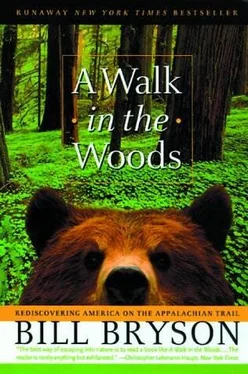Bill Bryson - A Walk In The Woods
Здесь есть возможность читать онлайн «Bill Bryson - A Walk In The Woods» весь текст электронной книги совершенно бесплатно (целиком полную версию без сокращений). В некоторых случаях можно слушать аудио, скачать через торрент в формате fb2 и присутствует краткое содержание. Жанр: Современная проза, на английском языке. Описание произведения, (предисловие) а так же отзывы посетителей доступны на портале библиотеки ЛибКат.
- Название:A Walk In The Woods
- Автор:
- Жанр:
- Год:неизвестен
- ISBN:нет данных
- Рейтинг книги:4 / 5. Голосов: 1
-
Избранное:Добавить в избранное
- Отзывы:
-
Ваша оценка:
- 80
- 1
- 2
- 3
- 4
- 5
A Walk In The Woods: краткое содержание, описание и аннотация
Предлагаем к чтению аннотацию, описание, краткое содержание или предисловие (зависит от того, что написал сам автор книги «A Walk In The Woods»). Если вы не нашли необходимую информацию о книге — напишите в комментариях, мы постараемся отыскать её.
A Walk In The Woods — читать онлайн бесплатно полную книгу (весь текст) целиком
Ниже представлен текст книги, разбитый по страницам. Система сохранения места последней прочитанной страницы, позволяет с удобством читать онлайн бесплатно книгу «A Walk In The Woods», без необходимости каждый раз заново искать на чём Вы остановились. Поставьте закладку, и сможете в любой момент перейти на страницу, на которой закончили чтение.
Интервал:
Закладка:
It takes a week to ten days for most people to cross this notorious expanse. Because we had two weeks, we had my wife drop us at Caratunk, a remote community on the Kennebec River, thirty-eight miles short of Monson and the official start of the wilderness. We would have three days of limbering up and a chance to resupply at Monson before plunging irreversibly into the deepest woods. I had already done a little hiking to the west around Rangeley and Flagstaff Lakes, in the week before Katz came, as a kind of reconnoiter, so I felt as if I knew the terrain. Even so, it was a shock.
It was the first time in almost four months that I had hoisted a pack with a full load. I couldn’t believe the weight, couldn’t believe that there had ever been a time when I could believe the weight. The strain was immediate and discouraging. But at least I had been hiking. Katz, it was quickly evident, was starting from square one-actually, several score pancake breakfasts to the wrong side of square one. From Caratunk it was a long, gently upward haul of five miles to a big lake called Pleasant Pond, hardly taxing at all, but I noticed right away that he was moving with incredible deliberativeness, breathing very hard, and wearing a kind of shocked. “Where am I?” expression.
All he would utter was “Man!” in an amazed tone when I asked him how he was, and a single heartfelt “Fuhhhhhhhhck”-breathy and protracted, like the noise of a plumped cushion when someone sits on it-when he let his pack fall from his back at the first rest stop after forty-five minutes. It was a muggy afternoon and Katz was a river of sweat. He took a water bottle and downed nearly half of it. Then he looked at me with quietly desperate eyes, put his pack back on, and wordlessly returned to his duty.
Pleasant Pond was a vacation spot-We could hear the happy shrieks of children splashing and swimming perhaps a hundred yards away-though we couldn’t see anything of the lake through the trees. Indeed without their gaiety we wouldn’t have known it was there, a sobering reminder of how suffocating the woods can be. Beyond rose Middle Mountain, just 2,500 feet high but acutely angled and an entirely different experience on a hot day with a cumbersome pack sagging down on tender shoulders. I plodded joylessly on to the top of the mountain. Katz was soon far behind and moving with shuffling slowness.
It was after six o’clock when I reached the base of the mountain on the other side and found a decent campsite beside a grassy, little-used logging road at a place called Baker Stream. I waited a few minutes for Katz, then put up my tent. When he still hadn’t come after twenty minutes, I went looking for him. He was almost an hour behind me when I finally found him, and his expression was glassy-eyed.
I took his pack from him and sighed at the not entirely unexpected discovery that it was light.
“What’s happened to your pack?”
“Aw, I threw some stuff,” he said unhappily.
“What?”
“Oh, clothes and stuff.” He seemed uncertain whether to be ashamed or belligerent. He decided to try belligerence. “That stupid sweater for one thing.” We had disputed mildly over the need for woolens.
“But it could get cold. It’s very changeable in the mountains.”
“Yeah, right. It’s August, Bryson. I don’t know if you noticed.”
There didn’t seem much point in trying to reason with him When we reached the camp and he was putting up his tent I looked into his pack. He had thrown away nearly all his spare clothes and, it appeared, a good deal of the food.
“Where’s the peanuts?” I said. “Where’s all your Slim Jims?”
“We didn’t need all that shit. It’s only three days to Monson.”
“Most of that food was for the Hundred Mile Wilderness, Stephen. We don’t know what kind of supplies there’ll be in Monson.”
“Oh.” He looked struck and contrite. “I thought it was a lot for three days.”
I looked despairingly in the pack and then looked around.
“Where’s your other water bottle?”
He looked at me sheepishly. “I threw it.”
“You threw a water bottle?” This was truly staggering. If there is one thing you need on the trail in August, it is lots of water.
“It was heavy.”
“Of course it’s heavy. Water’s always heavy. But it is also kind of vital, wouldn’t you say?”
He gave me a helpless look. “I just had to get rid of some weight. I was desperate.”
“No, you were stupid.”
“Yeah, that too,” he agreed.
“Stephen, I wish you wouldn’t do these things.”
“I know,” he said and looked sincerely repentant.
While he finished putting up his tent, I went off to filter water for the morning. Baker Stream was really a river-broad, clear, and shallow-and very beautiful in the glow of a summery evening, with a backdrop of overhanging trees and the last rays of sunlight sparkling its surface. As I knelt by the water, I became curiously aware of something-some thing-in the woods beyond my left shoulder, which caused me to straighten up and peer through the clutter of foliage at the water’s edge. Goodness knows what impelled me to look because I couldn’t have heard anything over the musical tumult of water, but there about fifteen feet away in the dusky undergrowth, staring at me with a baleful expression, was a moose-full grown and female, or so I presumed since it had no antlers. It had evidently been on its way to the water for a drink When it was brought up short by my presence and now clearly was undecided what to do next.
It is an extraordinary experience to find yourself face-to-face in the woods with a wild animal that is very much larger than you. You know these things are out there, of course, but you never expect at any particular moment to encounter one, certainly not up close-and this one was close enough that I could see the haze of flealike insects floating in circles about its head. We stared at each other for a good minute, neither of us sure what to do. There was a certain obvious and gratifying tang of adventure in this, but also something much more low-key and elemental-a kind of respectful mutual acknowledgment that comes with sustained eye contact. It was this that was unexpectedly thrilling-the sense that there was in some small measure a salute in our cautious mutual appraisal. I was smitten.
I had recently read to my dismay that they have started hunting moose again in New England. Goodness knows why anyone would want to shoot an animal as harmless and retiring as the moose, but thousands of people do-so many, in fact, that states now hold lotteries to decide who gets a permit. Maine in 1996 received 82,000 applications for just 1,500 permits. Over 12,000 out-of-staters happily parted with a nonrefundable $20 just to be allowed to take part in the draw.
Hunters will tell you that a moose is a wily and ferocious forest creature. Nonsense. A moose is a cow drawn by a three-year-old. That’s all there is to it. Without doubt, the moose is the most improbable, endearingly hopeless creature ever to live in the wilds. Every bit of it-its spindly legs, its chronically puzzled expression, its comical oven-mitt antlers-looks like some droll evolutionary joke. It is wondrously ungainly: it runs as if its legs have never been introduced to each other. Above all, what distinguishes the moose is its almost boundless lack of intelligence. If you are driving down a highway and a moose steps from the woods ahead of you, he will stare at you for a long minute (moose are notoriously shortsighted), then abruptly try to run away from you, legs flailing in eight directions at once. Never mind that there are several thousand square miles of forest on either side of the highway. The moose does not think of this. Clueless as to what exactly is going on, he runs halfway to New Brunswick before his peculiar gait inadvertently steers him back into the woods, where he immediately stops and takes on a startled expression that says, “He-woods. Now how the heck did I get here?” Moose are so monumentally muddle-headed, in fact, that when they hear a car or truck approaching they will often bolt out of the woods and onto the highway in the curious hope that this will bring them to safety.
Читать дальшеИнтервал:
Закладка:
Похожие книги на «A Walk In The Woods»
Представляем Вашему вниманию похожие книги на «A Walk In The Woods» списком для выбора. Мы отобрали схожую по названию и смыслу литературу в надежде предоставить читателям больше вариантов отыскать новые, интересные, ещё непрочитанные произведения.
Обсуждение, отзывы о книге «A Walk In The Woods» и просто собственные мнения читателей. Оставьте ваши комментарии, напишите, что Вы думаете о произведении, его смысле или главных героях. Укажите что конкретно понравилось, а что нет, и почему Вы так считаете.












